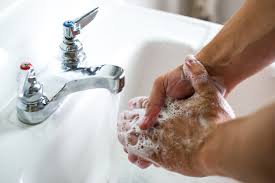Hand washing has become the acceptable way of reducing transmission of micro-organisms, according to a study in the archives of medicine. Keeping the hands clean is one of the most important steps taken to avoid getting sick and spreading germs to others.
The spread of germs between humans can occur directly through hands, or indirectly through an environmental sources by having contact with them. However, hand washing is not a very common practice as people neglect the effect of washing hand.
The practice of hand washing is one of the effective ways to prevent disease and the spread of germs. The spread of many diseases and
conditions can be controlled by hand washing practice. According to CDC centers for the disease control, washing of hand is of great significance in preventing gerrms from spreading. The world health Organization estimated 50% reduction in death caused by diarrhea through washing of hands with water and soap. A London base researchers noted that proper washing of hands as a normal routin could prevent millions of death in a year.
Washing hands with soap and water is
the best way to reduce the number of germs on them in most situations. The hand is the medium through which germs enter into the body.
 Good hand washing
techniques include using an adequate amount of soap, rubbing the hands together
to create friction, and rinsing under running water. The use of gloves is not a
substitute for hand washing. and When soap and water are not available, it isu advisable to use an alcohol-based hand sanitizer that contains
at least 60% alcohol.
Good hand washing
techniques include using an adequate amount of soap, rubbing the hands together
to create friction, and rinsing under running water. The use of gloves is not a
substitute for hand washing. and When soap and water are not available, it isu advisable to use an alcohol-based hand sanitizer that contains
at least 60% alcohol.
Alcohol-based hand sanitizers can quickly reduce the
number of germs on hands in some situations, but sanitizers do not
eliminate all types of germs, however, it is not effective when the hands are heavily contaminated with
dirt, blood, or other organic materials.
Soaps
create a slippery surface that allows the organisms to "slide off".
WHEN TO WASH TOUR HANDS:
Before and after treating a cut or wound
After using the toilet
After changing diapers or cleaning up a child who has used the toilet
After blowing your nose, coughing, or sneezing
After touching an animal, animal feed, or animal waste
After handling pet food or pet treats
After touching
garbage.
Before and after eating food
After doing work.
In the hospital,after handling a patient.
WHY SHOULD YOU WASH YOUR HANDS
To Avoid spread of disease.
To remove the dirt in your hand
To get your hand fresh again after engaging in a work.
It is very good to adopt the practice of washing hands.
The practice of hand washing with soap and water can promote general health of an individual through reduced spread of diseases. Recently,experts suggest that washing hands may help in elimination of Ebola disease.
The practice of hand washing should be considered important in promoting and maintaining health. Cdc in their website agreed that keeping the hands clean is one of the most important steps we can take to avoid getting sick and spreading germs to others, thus they It also recommends washing of hand with soap and water for atleast 15 seconds.
Click the follow button to follow this blog.
Sources: cdc.gov /whywas your hands?
Archivesofmedicine.com/a study to acertain the practice of hand
hygiene among medical students
in Dominica.

No comments:
Post a Comment